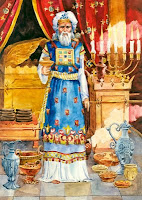In the Old Testament, the descendants of Levi were consecrated for among other things, temple service (Numbers 3:6-10, 18:2-7; Deuteronomy 10:8-9). The Levites were charged with ministering to the Kohanim (priests) and keeping watch over the Tabernacle (Numbers 18:2-6). (Contrary to popular belief, the Levites did not simply make God’s jeans.) All priests were Levites but not all Levites were priests (Numbers 18:1-2; Deuteronomy 21:5, 31:9). The book of Leviticus, which has a priestly impetus, is taken from the Greek meaning “relating to the Levites”.
Levi was the third son of Jacob a.k.a. Israel (Genesis 29:34, 35:23). God personally selected his descendants commanding “you shall cleanse them and present them as a wave offering; for they are wholly given to Me from among the sons of Israel. I have taken them for Myself instead of every first issue of the womb, the firstborn of all the sons of Israel (Numbers 8:15-16 NASB).”
The Levites were unique among Israel’s tribes. A special ceremony was held to consecrate the Levites and designate them to God’s service (Numbers 8:5-22). They were not eligible for military service as in conducting the census of the army, Moses was explicitly instructed to not count the Levites (Numbers 1:47-53, 2:33). The Levites were the only tribe not allotted land (Leviticus 25:32-34; Deuteronomy 10:8-9, 14:29; Joshua 13:13, 33, 14:3-4, 18:7) though they were given cities in which to reside (Numbers 35:1-5; Joshua 21:1-42). The Levites were given no inheritance as “the LORD, the God of Israel, is their inheritance” (Joshua 13:33 NASB). The Levites were dependent upon the landed tribes for sustenance, namely through tithes (Numbers 18:8-31; Deuteronomy 12:19), particularly the tithe known as the Maaser Rishon or Levite Tithe (Numbers 18:21-26).
Was the Levites designation as clergy a boon or did they draw the short end of the stick? In an era of the priesthood of all believers, should Christians mimic the ordinances set for the Levites? Why were the Levites set apart as Levi never demonstrated any moral superiority over his brothers (Genesis 34:1-31, 49:5-7)?
The Levites were selected for the clerical task because they were the tribe who stood with Moses in the blasphemous incident of the Golden Calf (Exodus 32:26-29). While Moses was on Mount Sinai convening with God and retrieving the Ten Commandments, the people became restless and convinced Aaron to fashion a Golden Calf (Exodus 32:1-6). When Moses returned, the Levites were the tribe which banded with Moses against the idolaters (Exodus 32:26). In fact, they killed 3000 infidels that very day (Exodus 32:28). It was presumably this zeal that set them apart for the priesthood (Exodus 32:29).
Ironically, both Moses and Aaron were Levites (Exodus 2:1-10, 4:14; Numbers 26:59; Joshua 21:4, 10).
In contrast, today Christian clergy are selected based on an individual sense of calling as opposed to being born into the profession.
Which system of clergy selection do you prefer? What are the benefits of both methods? What overarching factors changed to necessitate the change in clergy appointment? Have you known any second generation ministers? What are the advantages?

No comments:
Post a Comment